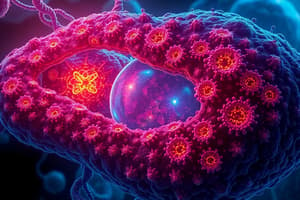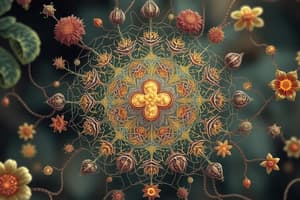Podcast
Questions and Answers
What is the basic unit of life?
What is the basic unit of life?
- Tissue
- Cell (correct)
- Organism
- Organ
Which of the following is NOT a type of tissue?
Which of the following is NOT a type of tissue?
- Connective
- Epithelial
- Muscle
- Prokaryotic (correct)
What process allows organisms to maintain a stable internal environment?
What process allows organisms to maintain a stable internal environment?
- Homeostasis (correct)
- Reproduction
- Growth
- Metabolism
Which of the following is an example of an organ system?
Which of the following is an example of an organ system?
What type of reproduction involves only one organism?
What type of reproduction involves only one organism?
Which of the following domains includes organisms with prokaryotic cells and often thrives in extreme conditions?
Which of the following domains includes organisms with prokaryotic cells and often thrives in extreme conditions?
What is the role of genes in living organisms?
What is the role of genes in living organisms?
Which level of biological organization includes all ecosystems on Earth?
Which level of biological organization includes all ecosystems on Earth?
Flashcards are hidden until you start studying
Study Notes
Fundamental Concepts of Biology
- Definition: Biology is the study of living organisms, their structure, function, growth, evolution, and interactions with their environment.
Levels of Biological Organization
-
Cells:
- Basic unit of life.
- Types: prokaryotic (no nucleus) and eukaryotic (nucleus present).
-
Tissues:
- Groups of similar cells performing a specific function.
- Types: epithelial, connective, muscle, nervous.
-
Organs:
- Structures composed of different types of tissues working together.
- Example: Heart, brain.
-
Organ Systems:
- Groups of organs that perform related functions.
- Example: Circulatory system, nervous system.
-
Organisms:
- Individual living entities.
-
Populations:
- Groups of the same species living in a specific area.
-
Communities:
- Interactions among different populations in a certain area.
-
Ecosystems:
- Communities plus their physical environment.
-
Biosphere:
- The global sum of all ecosystems; zones of life on Earth.
Key Biological Processes
-
Metabolism:
- The sum of all chemical reactions in an organism.
- Includes catabolism (breaking down molecules) and anabolism (building molecules).
-
Homeostasis:
- The process by which organisms maintain a stable internal environment.
-
Reproduction:
- The biological process by which new individual organisms are produced.
- Types: asexual (single organism) and sexual (two organisms).
-
Growth and Development:
- Changes an organism undergoes from conception to maturity.
Genetic Principles
-
DNA:
- The genetic material that carries information for growth, development, and reproduction.
-
Genes:
- Segments of DNA that code for proteins and determine traits.
-
Natural Selection:
- Mechanism of evolution where organisms better adapted to their environment tend to survive and reproduce.
Classification of Life
- Taxonomy:
- The science of classifying organisms.
- Hierarchical levels: Domain, Kingdom, Phylum, Class, Order, Family, Genus, Species.
Major Domains of Life
-
Bacteria:
- Unicellular prokaryotes.
- Diverse metabolic pathways.
-
Archaea:
- Also unicellular prokaryotes.
- Often extremophiles (thriving in extreme conditions).
-
Eukarya:
- Organisms with eukaryotic cells.
- Includes plants, animals, fungi, and protists.
Ecosystems and Ecology
-
Ecosystem Dynamics:
- Energy flow (sunlight → producers → consumers → decomposers).
- Nutrient cycling (biogeochemical cycles).
-
Ecological Relationships:
- Predation, competition, symbiosis (mutualism, commensalism, parasitism).
Evolution
-
Theory of Evolution:
- Explains the diversity of life through processes such as mutation, gene flow, genetic drift, and selection.
-
Speciation:
- The formation of new and distinct species in the course of evolution.
Importance of Biology
- Understanding living systems impacts medicine, environmental science, biotechnology, and conservation efforts.
Fundamental Concepts of Biology
- Biology studies living organisms, encompassing their structure, function, growth, evolution, and environmental interactions.
Levels of Biological Organization
- Cells: Fundamental life unit; categorized into prokaryotic (lack a nucleus) and eukaryotic (have a nucleus).
- Tissues: Groups of similar cells performing specific functions; include epithelial, connective, muscle, and nervous types.
- Organs: Combinations of various tissues working in concert; examples include the heart and brain.
- Organ Systems: Groups of organs that collaborate to fulfill overarching biological functions; includes circulatory and nervous systems.
- Organisms: Individual living entities capable of growth and reproduction.
- Populations: Collections of the same species inhabiting a defined area.
- Communities: Various populations interacting within a specific locality.
- Ecosystems: Integrate communities with their physical environments.
- Biosphere: Encompasses all ecosystems globally, representing Earth's life zones.
Key Biological Processes
- Metabolism: All chemical reactions within an organism, divided into catabolic (breaking down) and anabolic (building up) processes.
- Homeostasis: Mechanism maintaining stable internal conditions despite external changes.
- Reproduction: Generation of new individuals, can occur asexually (single parent) or sexually (two parents).
- Growth and Development: Encompasses physical and biological changes from inception to maturity.
Genetic Principles
- DNA: The hereditary material that contains molecular instructions for organismal growth and reproduction.
- Genes: DNA fragments encoding proteins, influencing inherited traits.
- Natural Selection: Evolutionary mechanism favoring the survival and reproduction of better-adapted organisms.
Classification of Life
- Taxonomy: Classifying organisms into hierarchical groups: Domain, Kingdom, Phylum, Class, Order, Family, Genus, Species.
Major Domains of Life
- Bacteria: Unicellular prokaryotes characterized by a variety of metabolic processes.
- Archaea: Unicellular prokaryotes often found in extreme environments.
- Eukarya: Organisms with eukaryotic cells, including plants, animals, fungi, and protists.
Ecosystems and Ecology
- Ecosystem Dynamics: Involves energy flow from sunlight to producers, then to consumers and decomposers, along with nutrient cycling through biogeochemical processes.
- Ecological Relationships: Include interactions such as predation, competition, and symbiosis (e.g., mutualism, commensalism, parasitism).
Evolution
- Theory of Evolution: Accounts for the biodiversity of life through mechanisms like mutation, gene flow, genetic drift, and selection.
- Speciation: Refers to the development of new species through evolutionary processes.
Importance of Biology
- Insights into living systems advance fields such as medicine, environmental science, biotechnology, and conservation efforts.
Studying That Suits You
Use AI to generate personalized quizzes and flashcards to suit your learning preferences.




